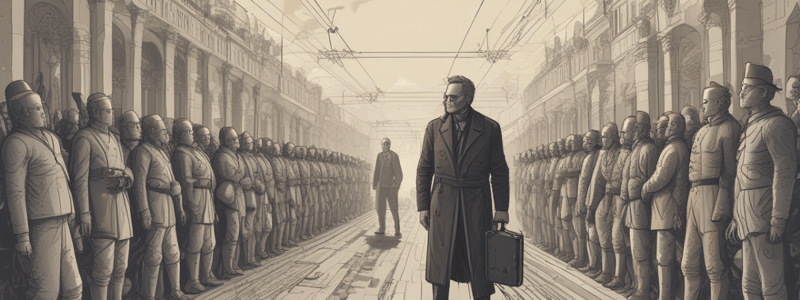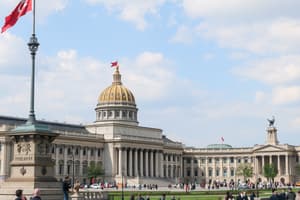Podcast
Questions and Answers
Every organization, eventually, ends up in an ______.
Every organization, eventually, ends up in an ______.
oligarchy
The simple-majority single-ballot system favours the ______-party system.
The simple-majority single-ballot system favours the ______-party system.
two
The first separate school of political science was established in 1872 in ______ as the École Libre des Sciences Politiques.
The first separate school of political science was established in 1872 in ______ as the École Libre des Sciences Politiques.
France
The newspapers are regarded by democrats as a ______ for their own defects.
The newspapers are regarded by democrats as a ______ for their own defects.
One of the theoretical approaches of comparative politics is ______.
One of the theoretical approaches of comparative politics is ______.
Maurice Duverger is known for his ______ laws.
Maurice Duverger is known for his ______ laws.
What are the ______ approaches of comparative politics?
What are the ______ approaches of comparative politics?
What are the theoretical approaches of ______ politics?
What are the theoretical approaches of ______ politics?
______ What are the theoretical approaches of comparative politics?
______ What are the theoretical approaches of comparative politics?
According to ______, what makes a decision authoritative is related to power.
According to ______, what makes a decision authoritative is related to power.
[Blank] is the study of institutions and actors in different political systems.
[Blank] is the study of institutions and actors in different political systems.
______ ENVIRONMENT What are the theoretical approaches of comparative politics?
______ ENVIRONMENT What are the theoretical approaches of comparative politics?
______ What are the theoretical approaches of comparative politics?
______ What are the theoretical approaches of comparative politics?
Aristotle, a Greek philosopher, lived from ______ to ______.
Aristotle, a Greek philosopher, lived from ______ to ______.
Comparative politics aims to provide a ______ conception of reality.
Comparative politics aims to provide a ______ conception of reality.
Roberto ______ was an Italian sociologist and socialist who lived from 1876 to 1936.
Roberto ______ was an Italian sociologist and socialist who lived from 1876 to 1936.
Comparative politics tries to explain why some ______ regimes turn into democracy and others do not.
Comparative politics tries to explain why some ______ regimes turn into democracy and others do not.
Match the following scholars with their contributions to comparative politics:
Match the following scholars with their contributions to comparative politics:
Match the following concepts with their definitions in comparative politics:
Match the following concepts with their definitions in comparative politics:
Match the following theorists with their areas of focus in comparative politics:
Match the following theorists with their areas of focus in comparative politics:
Match the following goals with their corresponding methods in comparative politics:
Match the following goals with their corresponding methods in comparative politics:
Match the following research questions with their corresponding approaches in comparative politics:
Match the following research questions with their corresponding approaches in comparative politics:
Match the following terms with their meanings in comparative politics:
Match the following terms with their meanings in comparative politics:
Match the theoretical approaches of comparative politics with their descriptions:
Match the theoretical approaches of comparative politics with their descriptions:
Match the theoretical approaches of comparative politics with their primary concerns:
Match the theoretical approaches of comparative politics with their primary concerns:
Match the theoretical approaches of comparative politics with their level of analysis:
Match the theoretical approaches of comparative politics with their level of analysis:
Match the theoretical approaches of comparative politics with their primary methods:
Match the theoretical approaches of comparative politics with their primary methods:
Match the theoretical approaches of comparative politics with their key assumptions:
Match the theoretical approaches of comparative politics with their key assumptions:
Match the following individuals with their contributions to political science:
Match the following individuals with their contributions to political science:
Match the following concepts with their descriptions:
Match the following concepts with their descriptions:
Match the following quotes with their authors:
Match the following quotes with their authors:
Match the following concepts with their associations:
Match the following concepts with their associations:
Match the following individuals with their areas of contribution:
Match the following individuals with their areas of contribution:
Match the following concepts with their relationships:
Match the following concepts with their relationships:
What is the primary focus of the International Environment approach in comparative politics?
What is the primary focus of the International Environment approach in comparative politics?
Which theoretical approach in comparative politics emphasizes the role of individuals in shaping political outcomes?
Which theoretical approach in comparative politics emphasizes the role of individuals in shaping political outcomes?
What is the primary concern of the Interests approach in comparative politics?
What is the primary concern of the Interests approach in comparative politics?
What is the primary level of analysis for the Ideas approach in comparative politics?
What is the primary level of analysis for the Ideas approach in comparative politics?
What is the primary method of the Interaction approach in comparative politics?
What is the primary method of the Interaction approach in comparative politics?
What is the primary concern of comparative politics?
What is the primary concern of comparative politics?
What is the primary characteristic of the simple-majority single-ballot system?
What is the primary characteristic of the simple-majority single-ballot system?
What is the primary goal of comparative politics in regards to institutions and actors?
What is the primary goal of comparative politics in regards to institutions and actors?
What is the relationship between power and authoritative decisions according to Max Weber?
What is the relationship between power and authoritative decisions according to Max Weber?
What is the Iron Law of Oligarchy?
What is the Iron Law of Oligarchy?
Who wrote 'Public Opinion'?
Who wrote 'Public Opinion'?
What is the primary focus of the theoretical approach of comparative politics known as International Relations?
What is the primary focus of the theoretical approach of comparative politics known as International Relations?
What is the name of the school established in 1872 in France?
What is the name of the school established in 1872 in France?
What is the significance of Roberto Michels in comparative politics?
What is the significance of Roberto Michels in comparative politics?
What is the primary concern of comparative politics?
What is the primary concern of comparative politics?
What is the primary goal of comparative politics in regards to radical-right parties?
What is the primary goal of comparative politics in regards to radical-right parties?
What is the significance of Walter Lippmann's quote?
What is the significance of Walter Lippmann's quote?
Flashcards are hidden until you start studying



